Best Shop Vac
A list of the best shop vacs including wet-dry vacuums for woodworking, dust, and water collection.
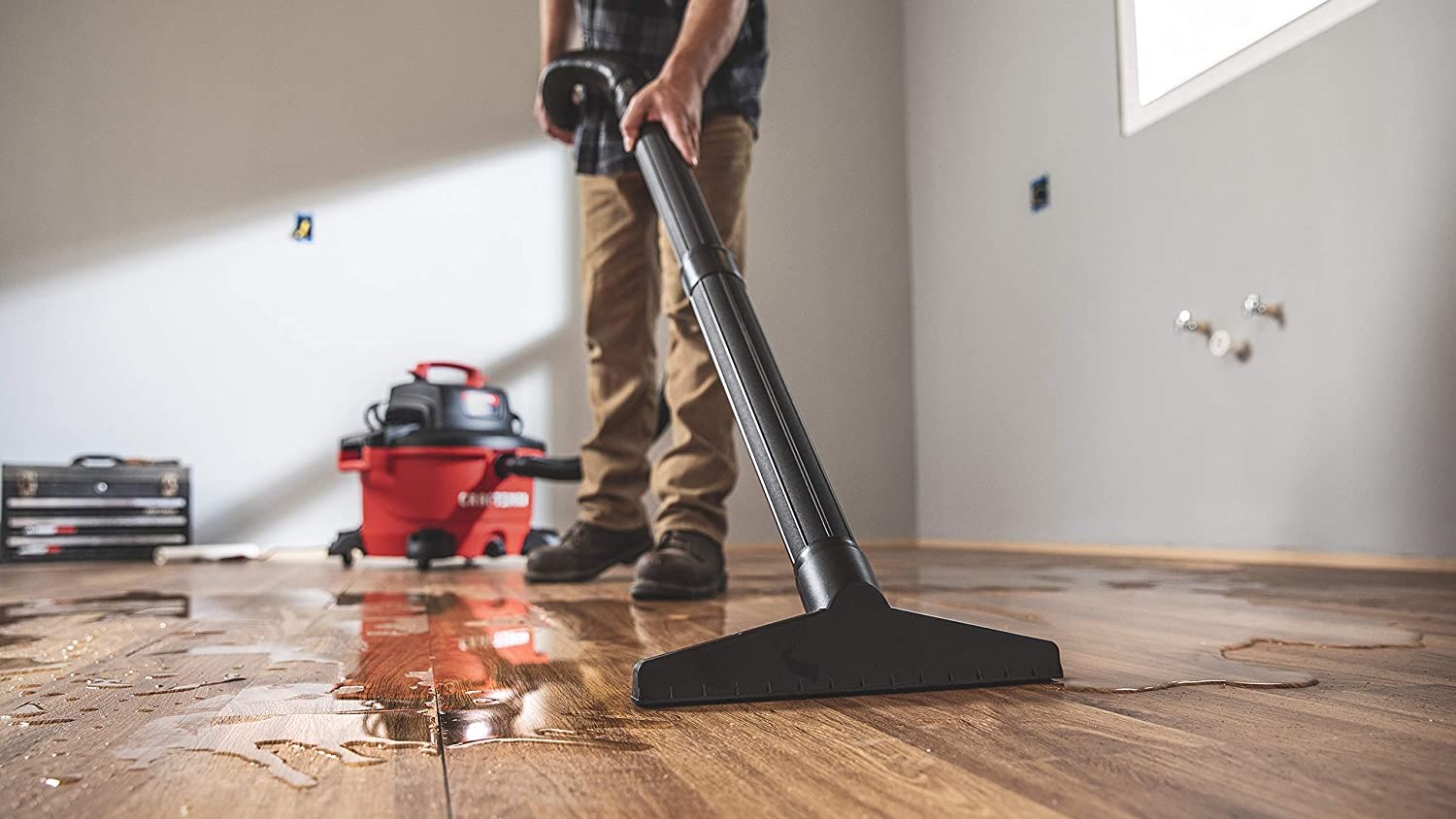
Sign up to receive the latest news, reviews, buying guides and deals direct to your inbox
You are now subscribed
Your newsletter sign-up was successful
Any of the best shop vacuums make it easy to suck up large messes such as dust, wood shavings, and even water (hence the alternative name of “wet-dry vacuum”). This makes them perfect for professional use in shops, or on building sites. These powerful vacuums can handle nails, mulch, and water, and we’ve rounded up our favorites in this handy guide to make it easy for you to find the best shop vacuum for your specific needs, be that large or small debris, or even light flooding.
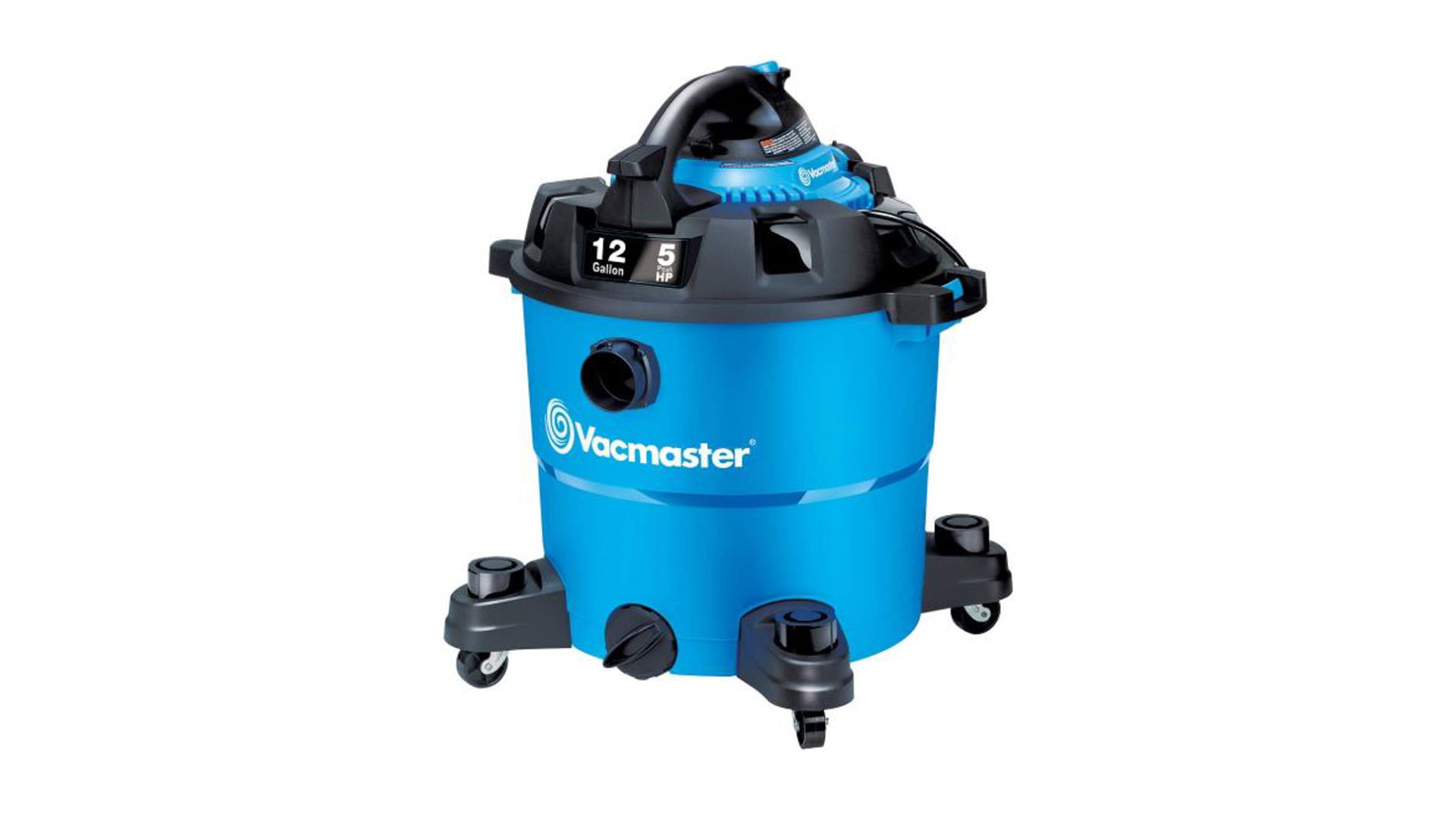
Vacmaster VBV1210
Deals with everything thrown at it
The Vacmaster VBV1210 comes with a 12-gallon tank to clean up plenty of messy materials and water. This versatile device can be easily converted to a handheld blower with 210 mph blowing power, so you can clear away leaves, dirt, and other debris.
Pros:
- Use as a blower
- Big 12-gallon tank
Cons:
- Extra filter needed for cleaning dust
The Vacmaster comes with a cartridge filter to clean dry debris and a foam filter for cleaning up wet messes. It is recommended that you purchase a seperate filter for vacuuming up dust. This shop vac comes with a drain port on the bottom of the tank, so you can simply pull that to remove fluids you’ve collected. The Vacmaster is equipped with a thick hose that is 2.5 inches in diameter and 7 feet long. You can move the machine around by the hose without worrying about the hose coming off.
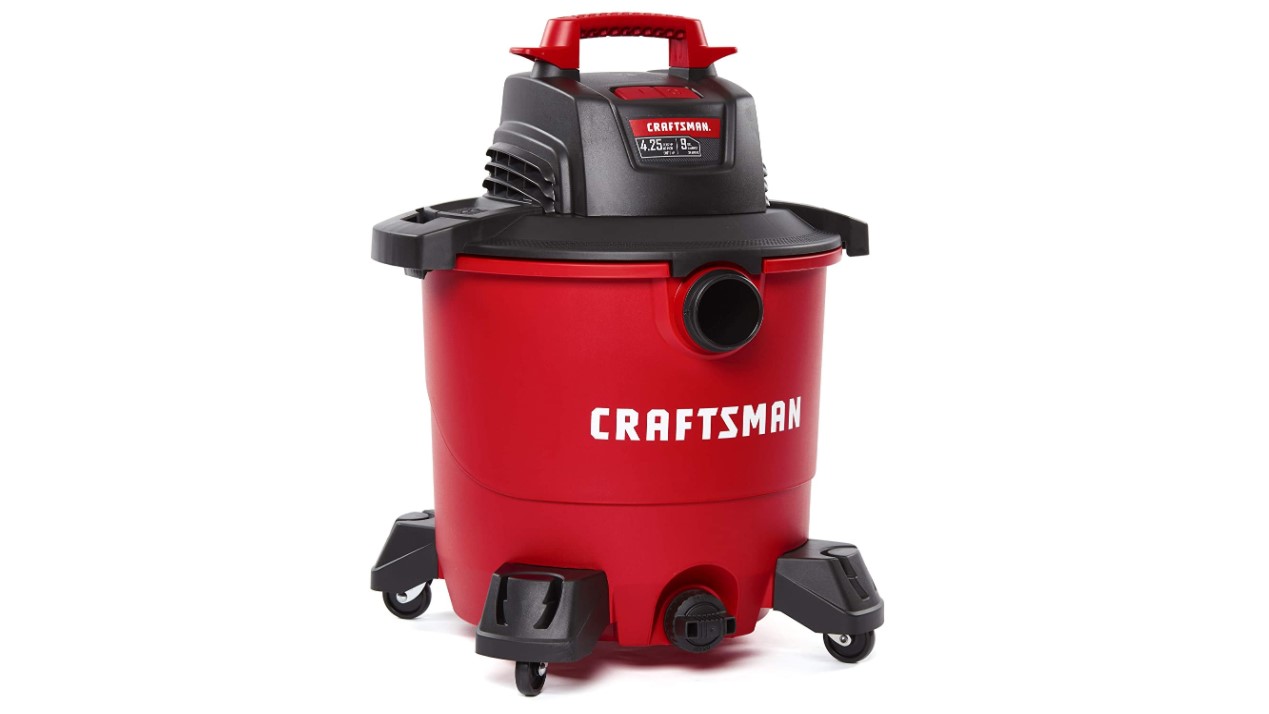
Craftsman CMXEVBE17590
Perfect for wet and dry use
The Craftsman CMXEVBE17590 comes with two extension wands that lengthen the 10-foot hose to a generous 17 feet, giving you considerable reach without needing to move the machine.
Pros:
- 17-foot reach
- Large tank
- Affordable
Cons:
- No blower attachment
The Craftsman CMXEVBE17590 has an impressive amount of horsepower. It holds nine gallons of liquid and has an oversized drain for convenient emptying. The filters are easy to clean and replace, and you can also use this shop vacuum as a blower. It comes with a great selection of attachments to help you reach crevices and tackle a great range of tasks. You don’t get a blower extension to make the most of this feature, but there is a great selection of attachments to help you reach crevices and tackle a great range of tasks.
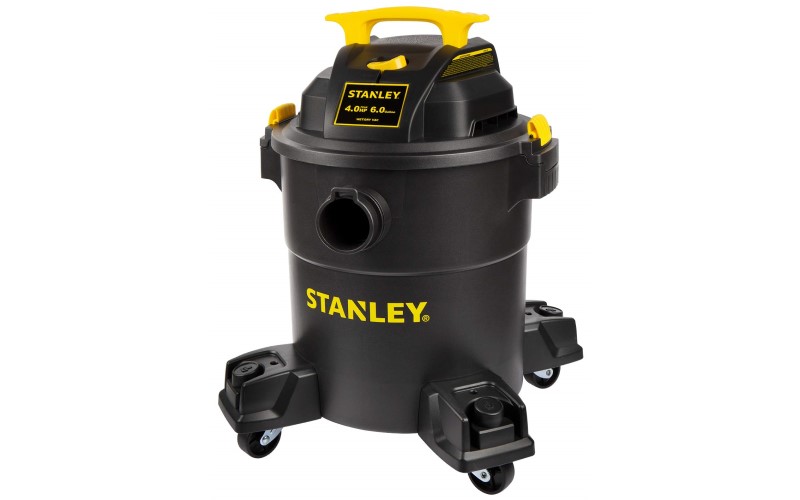
Stanley SL18116P
Tackles large and small messes
This Stanley wet/dry vacuum holds up to 6 gallons. It’s powerful enough to pick up large messes in the home, car, garage, or workshop. It’s great for picking up construction messes, too.
Pros:
- Affordable
- Lightweight
- Great with liquid
Cons:
- No drain port
- Not the most powerful
The hose is 6 ft long and the power cord is 10 ft. Together that gives this shop vac 16 feet of reach. It comes with two extension wands and a crevice tool to give you more reach and make it easier to clean small areas. The Stanley SL18116P has two filters, a foam filter for wet messes and a reusable filter for dry messes. Both can be cleaned a reused a few times before needing to be replaced. In our tests, this shop vac sucked up a gallon of water in under five seconds, however, it doesn't have a drain port, so it will need to be tipped after each use.
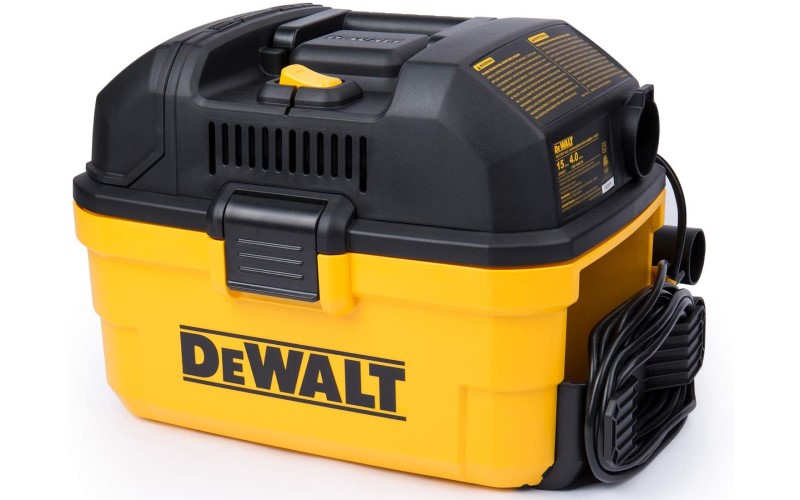
DeWalt DXV04T
Good for cars and RVs
The DeWalt DXV04T is compact and quiet. It helps tidy up without the clunky tanks and noise of the bigger models. Since it’s compact it is easy to take to different places and is a good choice for vacuuming out cars, trucks, and RVs.
Pros:
- Quiet
- Compact
- Can be used cordless
Cons:
- Not the strongest suction
This portable vacuum handles both wet and dry messes and holds a lot of debris in its 4-gallon tank. Ir includes a rechargable battery, so you don't have to always plug it into the wall before using it. It does double as a blower, which can be helpful in corralling messes. It doesn't have the best suction capacity. We needed to pass over messes a few times to get everything up. But while we tested more powerful shop vacuums, this one is still convenient for reaching smaller areas and for its portability.
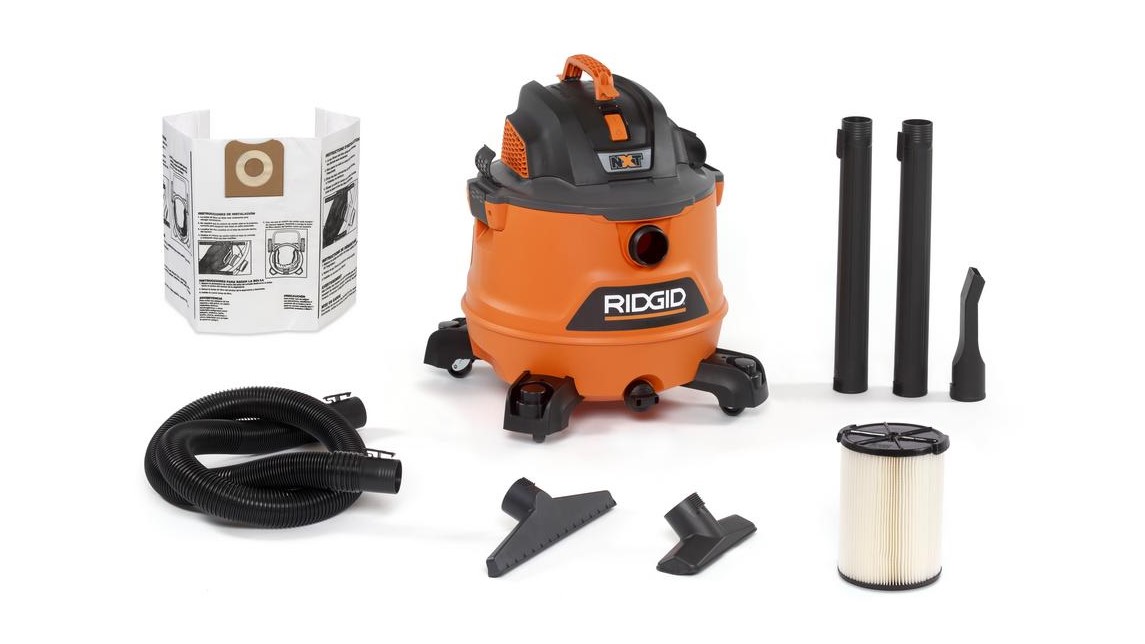
Ridge WD1450
A massive tank and powerful motor
The Ridgid WD1450 is impressive when it came to cleaning up messes, whether fine materials, larger debris, or water. This unit comes with a 14-gallon tank and different filters for dry and wet messes.
Pros:
- Six-horespower motor
- Super powerful
- Large tank
Cons:
- Heavier than most
This shop vacuum provides 360-degree wheels so it is easy to maneuver. It offers a dual-flex hose, which is one that can move in any direction and not collapse. You also can simply flip a switch and turn the hose into a blower, which adds another dimension to your cleaning capabilities with this shop vacuum. The power cord reaches 20 feet, and it has a 7-foot hose that is average for the industry.
Shop Vac Design: What Do You Need?
Why you can trust Top Ten Reviews
The best shop vacuums give you lengthy hoses, several different extension tools, and power cords that extend up to 20 feet and can be locked in place. It's also helpful to get a shop vacuum with a big tank, and our top-notch vacuums have tanks as big as 14 gallons. However, you might not need something so large for the jobs you do and the storage space you have. In that case, you can get vacuums with tanks as small as 2 gallons.
Shop Vac Filters: Does a Shop Vac Need a Filter?
This is one of the most common questions people looking to purchase a shop vac has. It really comes down to what you are going to use it for. If you are using the vacuum for larger objects and not fine particles, you don't necessarily need a filter. If you often vacuum fine materials like ash or sawdust, you should look for a dust filter that traps tiny particles. Without a filter in place when you vacuum up sawdust or other fine particulates, you'll most likely just end up blowing the particles out of the shop vac again, which ultimately defeats the purpose of vacuuming!
Shop vacuums come with different filters – some are cloth bags you must replace, and others are cartridges you can clean and reuse. Most models come with a pleated cartridge filter, which is easier to change and less likely to leak than a foam or cloth filter.
Shop Vac Attachments: What Jobs Do You Need Your Vacuum to Do?
Attachments can make all the difference in deciding if a particular wet-dry vacuum is right for your needs. Most shop vacuums have extension wands for hard-to-reach areas, but some come with multiple wands for added reach. For cleaning bulky debris, brush nozzles work best, and crevice tools are good for cleaning corners or cracks. For the blower, some vacuums come with a special wide tool for covering a larger area. For wet cleanup, look for squeegees and concentration nozzles. We reiterate Paul Mayer's advice above and encourage you to evaluate how you'll primarily use your shop vac, as this is more important than the sale price in the end.
How Much Does a Shop Vacuum Cleaner Cost?
Shop vacs do not vary too widely in terms of price. The most popular ones cost between $70 and $150, with the average cost falling to about $100. The higher-priced products did tend to perform better, but not in every case. For example, the DeWalt DCV581H is designed as a portable shop vacuum, but because of this, it lacks the power and capacity of larger shop vacs.
How we tested
We spent more than 40 hours running the shop vacuums we chose for testing through a series of trials to see how well each performed. For our tests, we vacuumed up typical materials you'd run into in your own home or garage. We measured 2 ounces of mulch and sawdust mixed with six small screws and spread it on a piece of carpeting. After using each machine to clean up the mess, we then measured how much of the debris the shop vacuums picked up after one pass. We deliberately included bigger pieces of mulch to see how well all the shop vacuums performed when handling heavier items.
To test suction, we measured 2 gallons of water, poured it into a bathtub with the drain stopper in and then vacuumed up the water, taking note of how long it took for each vacuum to complete the task. We found the best vacuums were up to three times faster than those on the lower end of our product lineup. After the vacuuming tests were done, we conducted somewhat subjective testing by examining how clean each filter appeared to be. We also conducted several general movement tests, such as moving the vacuums around by the hose or over an obstacle, to get a sense of how easy it was to maneuver each vacuum.
Why trust us
Reviews
Dreame L40 Ultra Robot Vacuum Cleaner and Mop review: almost hands-free cleaning
Eureka J15 Pro Ultra Robot Vacuum review: hands-free cleaning for busy families
Dyson WashG1 Wet Floor Cleaner review: powerful suction for big and small messes
Shark AZ3002 Stratos Upright Vacuum review: a powerful cleaner for challenging debris
Ultenic U16 Flex Cordless Stick Vacuum review: an inexpensive choice for hard-to-reach areas
Eureka NEU800 Omniverse Multi-Function Upright Vacuum review: a powerful yet cheap cleaner
Shark AZ4002 PowerDetect Upright Vacuum review: Intuitive enough for all of your needs
We have been researching and testing shop vacuums since 2012 and have devoted hundreds of hours to reviewing and testing different products to find the very best shop vacuum. We looked for a range of cleaning capabilities in the products we examined and made a concerted effort to find shop vacuums that could handle the different kinds of messes you may encounter at home, ranging from drywall dust scattered around on a floor to a flooded basement.
Among other things, we studied manufacturer websites and sought out expert opinions for advice on finding the best product. Paul Mayer is a Minnesota-based woodworker and tool reviewer that you can see in action on the Tool Metrix channel on YouTube. He has owned a lot of shop vacs over the years and now uses a large dust collector more than any shop vac. He still uses a shop vac for anything left after he sweeps up the floors, though. He recommends doing specific research.
"Know what you need to use it for and read reviews, looking for exactly your use case. If someone is happy with it but is using it for a different task, then it won't necessarily work for what you want," said Mayer. "Example: It doesn't matter if it will pick up a bowling ball. If you are wanting it to extract dust from a cabinetmaker's table saw then you will be disappointed."
Mayer said his favorite shop vac is super quiet and has a built-in filter cleaning mechanism that works well. Those were common themes in many of the articles and reviews we read – concerns about the filter getting clogged and the extreme volume of some machines.
Sign up to receive the latest news, reviews, buying guides and deals direct to your inbox
Katie is a journalist who covers everything from hobbies to luxury travel and wellness. Also an editor for a luxury travel magazine, she is fascinated with the digital sphere and how it helps to inform and inspire people to get the most out of their lives.

